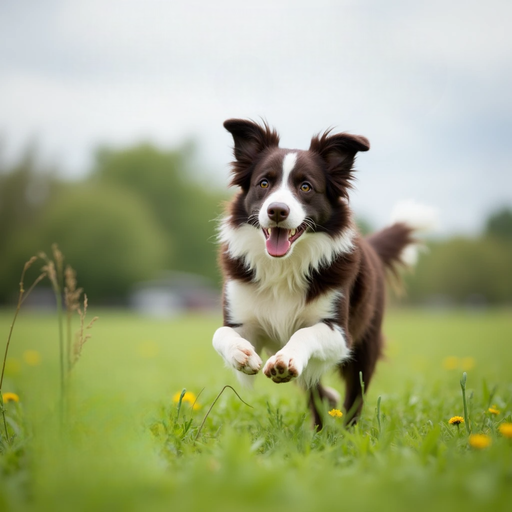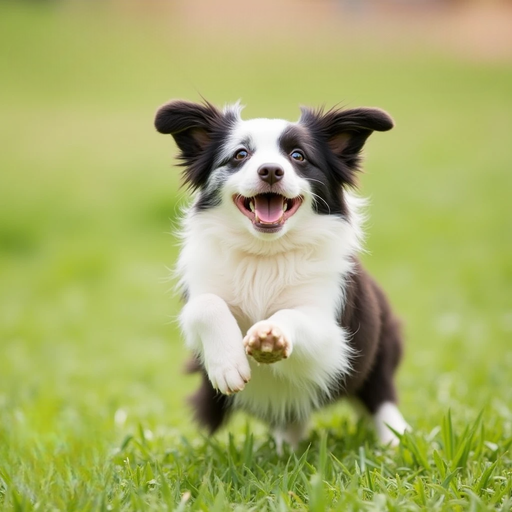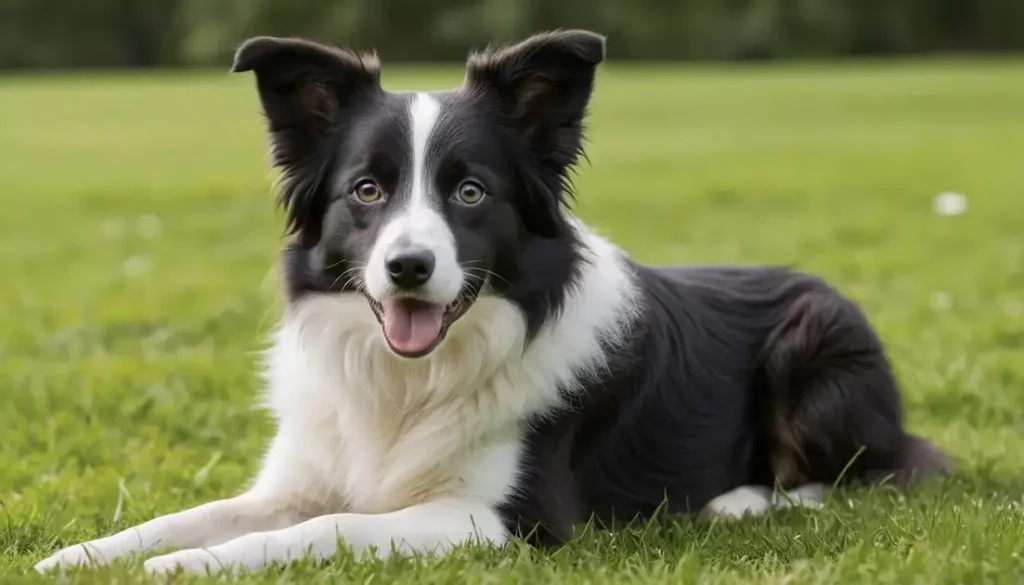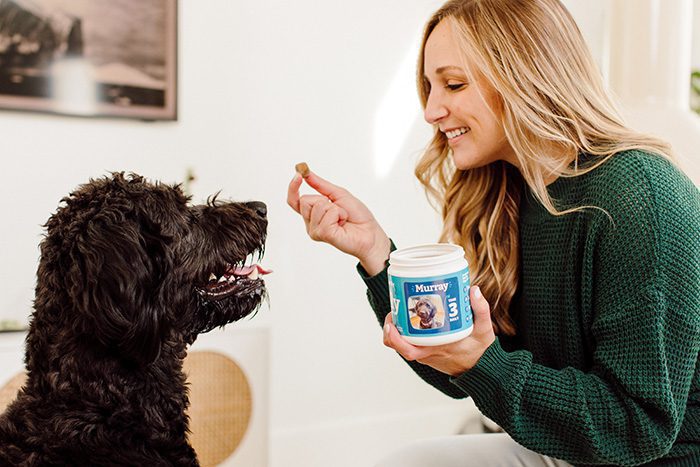Miniature Border Collies, also known as “mini Border Collies” or “mini Border Collies,” are a smaller variety of the standard Border Collie, typically standing 12 to 16 inches tall and weighing 15 to 30 pounds.
Known for their intelligence, trainability, and energetic demeanor, these dogs make excellent companions for active individuals and families, but they also require a specific set of care guidelines to ensure their safety and happiness.
It is worth noting that potential owners should be aware of common health concerns such as hip dysplasia and eye problems, and take proactive steps to manage these risks through regular veterinary checkups and responsible breeding practices.
Furthermore, the guide emphasizes the importance of providing an engaging environment that balances physical exercise with mental stimulation, as Miniature Border Collies are known for their high energy levels and intelligence.
While these dogs thrive in active households, their herding instincts may not be suitable for families with very young children, prompting the need for careful consideration when integrating them into home life.
Overall, this article aims to provide you with the knowledge necessary to care for healthy, well-adjusted, and happy Border Collies, while addressing their unique characteristics and the responsibilities associated with their care.
Characteristics of Mini Border Collies

The Border Collie, often referred to as the “mini Border Collie” or “mini Border Collie,” is a smaller variant of the standard Border Collie breed. These dogs typically stand 12 to 16 inches tall at the shoulder and weigh around 15 to 30 pounds.
Despite their small size, the Border Collie shares many physical traits with their larger counterparts, including a well-proportioned muscular build and a distinctive double coat that protects against the elements.
Their coat can vary in length and texture, and come in a range of colors including black and white, red and white, blue and white, and dappled.
Intelligence and Trainability
One of the most notable traits of the Border Collie is its high intelligence and trainability. Often considered one of the most intelligent dog breeds, they display a passion for learning and a strong desire to please their owners.
This breed thrives on mental stimulation and can excel in a variety of activities, including obedience trials, agility competitions, and dog sports like flyball.
Because of their intelligence, Mini Border Collies require consistent, positive reinforcement training methods and benefit greatly from early socialization to ensure a balanced behavior.
Temperament and Personality
Mini Border Collies are typically energetic, playful, and enthusiastic. They are known for their lively personalities, making them great companions for active individuals or families.
Despite their friendly nature, Mini Border Collies can be reserved with strangers, and are loyal and affectionate toward their families.
Compared to Standard Border Collies, they generally require slightly less exercise and mental stimulation due to their smaller size, however, they still need regular physical activity to stay happy and healthy.
Health and Lifespan
Mini Border Collies share similar health traits to their larger relatives, although their small size may affect certain health aspects. With proper care, nutrition, and regular veterinary checkups, they can live a long and healthy life.
Common health concerns in Mini Border Collies include hip dysplasia and eye problems, making early health checkups essential.
Care Requirements
Grooming
Proper grooming is essential to maintaining the health and appearance of Mini Border Collies. There are two basic coat types in the breed: the coarse coat, which is medium-length and wavy, and the smooth coat, which is shorter and coarser.
Regular brushing is essential to remove loose hair, prevent tangles, and reduce shedding. It is recommended to brush their coat at least once a week, with increased frequency during shedding seasons to keep their coat manageable.
Baths should be given sparingly, preferably every three to four months, and only when necessary, using shampoos with natural ingredients to avoid stripping the coat of essential oils.
In addition, regular ear checks for signs of infection, nail trimming to prevent overgrowth, and dental care are essential to overall health.
Diet and Nutrition
Nutrition plays a vital role in the health and well-being of Mini Border Collies. A balanced diet should include fresh meat as a primary ingredient, carbohydrates such as grains and potatoes, fats, fiber, and a variety of micronutrients. Puppies require a diet higher in calories, protein, and fat to support their growth, while adults require a balanced diet that meets their specific needs.
If your dog has a sensitive stomach, a low-residue, hypoallergenic diet may be beneficial.
Supplementing their diet with ingredients such as probiotics can promote gut health, while glucosamine can support joint health.
Regular veterinary consultations can help design a diet that meets individual health needs and prevent nutritional deficiencies.
Preventive Care
Preventive care is essential to ensuring the long-term health of Mini Border Collies. Regular veterinary checkups facilitate early detection of health problems and provide necessary vaccinations to protect against disease.
Keeping a detailed health record can help owners monitor their pet’s health and plan appropriate care.
In addition, pet insurance is recommended to mitigate the cost of unexpected medical expenses, as even healthy dogs can develop unexpected health problems.
Providing a safe and stimulating environment, along with regular exercise and mental challenges, is also essential to their overall happiness and well-being.
Special Considerations
Small Border Collies thrive in active households and may not be suitable for families with very young children due to their herding instincts, which can lead to unwanted behavior.
Not only does grooming strengthen the bond between owner and dog, but it also allows for regular health checks, making it easier to spot any potential problems early.
Adopting a routine that includes exercise, socialization, and health management is vital in promoting a happy and healthy life for your small Border Collie.

Health Considerations
Maintaining the health of your Border Collie requires a proactive approach that includes different aspects of care. Prevention is paramount, with an emphasis on a balanced diet, regular exercise, and proper grooming to mitigate the risk of health problems.
In addition, creating a safe and stimulating environment while avoiding exposure to harmful substances or extreme temperatures is essential to their well-being.
The Importance of Regular Veterinary Checkups
Regular veterinary checkups are essential to the overall health of your Border Collie, allowing for early detection of potential health problems.
These visits include essential components such as vaccinations, parasite prevention, dental care, and routine checkups, which collectively contribute to a healthy life.
Recognizing the Symptoms
Owners need to recognize the symptoms that warrant a visit to the veterinarian. Signs such as prolonged vomiting or diarrhea, weight loss, loss of appetite, or abdominal bloating should prompt immediate veterinary consultation.
Following your veterinarian’s instructions closely during any medical treatment, including courses of antibiotics or anti-inflammatories, is crucial to recovery.
Genetic Health Concerns
Awareness of genetic health issues is crucial to protecting the health of your Border Collie puppy. Conditions such as Collie eye anomaly (CEA) and trapped neutrophil syndrome (TNS) are inherited in an autosomal recessive manner, meaning both parents must pass on the mutated gene for the condition to appear.
Responsible breeding practices, including genetic testing, can help identify carriers of these conditions before they develop symptoms, reducing the risk of passing genetic issues on to future generations.
Common Physical Health Issues
Border Collies are also prone to several common physical health issues. Hip and elbow dysplasia is a major concern, causing pain and lameness due to abnormal joint development. Treatment may involve lifestyle changes, medication, or surgery depending on the severity of the condition.
Regular health checkups provide an opportunity for pet owners to discuss any dietary changes, allergies, or sensitivities their pets may have, further contributing to their health.
The Importance of Pet Insurance
Getting pet insurance is a responsible move for pet owners, as it can ease the financial burden associated with unexpected medical expenses. Even healthy dogs can experience serious health issues, such as pancreatitis or urinary tract obstruction, which can lead to large emergency bills.
Insurance ensures that dog owners can provide the best possible care for their Mini Border Collie without financial stress.

Mini Border Collies Training Tips
Training a young Border Collie requires a combination of mental stimulation, physical exercise, and positive reinforcement techniques to effectively harness their intelligence and energy.
Basic Training Techniques
To begin training, you’ll need a clicker trainer, some treats, and a lot of patience. Start with basic commands like “sit” and “stay,” then move on to simple tricks like “turn,” “talk,” and “shake hands.” As your dog masters the command, consider teaching him more elaborate tricks, such as retrieving specific items or performing complex routines.
Positive reinforcement is crucial in this process; using small, irresistible treats to reward desired behaviors strengthens the association between the command and the reward.
Mental Stimulating Activities
Mental exercise is essential for young Border Collies, who thrive on challenges. Incorporating puzzle toys that hide treats also encourages problem-solving and interaction. Start with easier games and gradually increase the complexity as your dog improves.
In addition, problem-solving games such as hide-and-seek or retrieving specific items on command can provide fun and mental engagement.
Agility Training
Agility training is an excellent way to keep your Mini Border Collie physically and mentally fit. Start with simple obstacle courses at home using household equipment such as broomsticks for jumping or chairs for tunnels. As your dog becomes comfortable, you can introduce more complex sequences and variations
. This type of training not only enhances his coordination and focus but also fosters a strong bond between you and your dog
. Consider enrolling in agility classes or clubs for professional guidance and building your dog’s confidence in different environments
Early Socialization
Early socialization plays a crucial role in shaping your Mini Border Collie’s behavior and personality. The first few months are vital to preventing bad habits and ensuring the ability to adapt to different situations. Introduce your puppy to different environments, sounds, and people in short sessions, using rewards and praise to reinforce calm behavior
. This process helps to create a well-rounded, confident dog who can handle social interactions successfully.
Maintain Training
As your Mini Border Collie matures, it is important to continue training and reinforcing positive behaviors. Use consistent methods, break tasks down into smaller goals, and monitor progress through reward charts or checklists. This approach not only reinforces learning but also strengthens the bond between you and your dog.
Remember, training should be a fun experience that fosters a positive mindset and deepens the relationship you share with your Mini Border Collie.
Living Arrangements
The ideal living environment for a Mini Border Collie balances adequate space for exercise with engaging mental stimulation. Although these dogs may be smaller in size, they still need plenty of room to move and play. Country or suburban homes with access to outdoor space are often preferred, but Mini Border Collies can adapt to urban living, provided they receive adequate exercise and mental challenges through daily activities such as walks, runs, and interactive playtime.
Space Requirements
Regardless of size, all Border Collies need a spacious environment to thrive. For Mini Border Collies, compact living arrangements, such as apartments, can be suitable if the owner is committed to providing the necessary exercise.
Owners should consider the space available and ensure that it accommodates the dog’s energy levels and physical activity needs. Having a fenced yard or access to open fields is very beneficial, especially for the more active Mini Border Collies who require regular opportunities to run and play.
Mental Stimulation
Mental stimulation is crucial for Mini Border Collies, as they are highly intelligent and can easily become bored without the right engagement.
Providing toys that challenge their intelligence, such as puzzle games or games that involve hide and seek, can help keep them entertained during quieter times at home. However, these activities should complement regular physical exercise rather than replace it. A balanced routine of exercise and mental challenges is essential to maintaining their overall happiness and well-being.
Conclusion
When considering adding a Mini Border Collie to the family, it is important to assess whether their active temperament will fit in with the family dynamics. Busy households with young children may need to assess whether they will be able to meet the high-energy and social needs of a Mini Border Collie. Additionally, potential owners must be prepared to commit the time required for training and exercise, which is essential to ensure the dog remains a happy and healthy companion.



